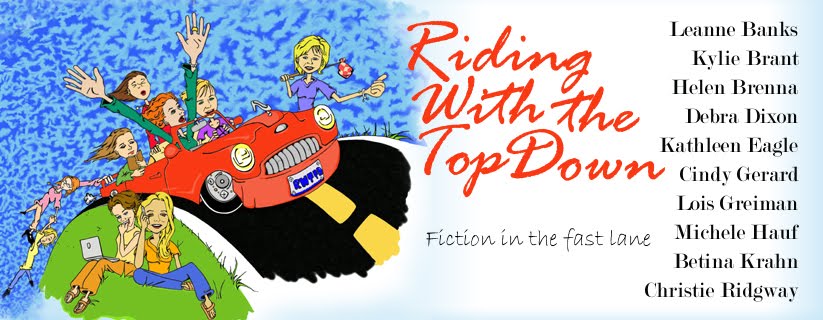
Yes, it's a giveaway day! But not before we have a little fun.
As I've said before, I've crept over to the editorial side of BelleBooks and Bell Bridge Books. That being the case, I thought today would be the perfect day to turn "5 Golden Rings" into "5 Golden Rules" for writers who query editors. Why? Someone stepped on my last nerve and, well, I have a blog to do. You might as well calibrate your snark meters. You're going to need them.
1) Don't tell me how good you are and that I'm going to be thinking about this book long after I've read it. That just makes me cringe. Also don't tell me that you've polished your work and believe it's ready for publication. (Editor Tip: You queried me so I'm very clear that YOU think you're ready for the big time.)
You're wasting precious real estate in your query letter. All I really care about is if you have a story that works for us. I don't want to be your mama, your BFF or your guru. I just want to know what the heck your book is about. (And, yes, I'm aware that about is a preposition at the end of this sentence, but it's also an adverb AND an adjective. Who could blame me for being confused?)
2) Don't send a query that is a multiple submission without having the brains to HIDE all the other addresses. Guess what happens when I see a blanket query? Yep. Delete. Why? A query like that means one of two things. Either the author isn't computer literate enough to work his/her email program, or they aren't targeting our company specifically. I'd rather work with a) smart folks or b) folks who actually want to be published by us. So, I hit delete.
3) Don't start the contract negotiation in the query letter. Telling me you want cover and title approval doesn't mean you're going to get it. If you want those things, I suggest you invest your own money and publish your own book. Don't even tell me your cover ideas. We aren't there yet. Let's cross one bridge at a time. And especially don't tell me you'd like to be considered for the cover assignment.
4) DO include your web page as part of your signature. By that I mean your career page. Not your MySpace or Facebook page where I can see pictures of your kitties and see that you are now--right this very moment--passing gas and lighting it on fire. Really. Dude. Not the image you want to leave me with, even if you do think that's  hysterically funny. What I want to see is that you're organized, focused, view your writing as professional. MySpace and FaceBook or a blog page are all fine if they are about you and your writing versus you and your...well, let's just say I don't want to come away feeling you're just a bag of wind. I want to get a sense of what you've written and what you might have done thus far. Your web page helps me see if you have a promotional mind set. Your web page won't get you bought, but a good web page will encourage me to read just a few more pages and give a writer the benefit of the doubt.
hysterically funny. What I want to see is that you're organized, focused, view your writing as professional. MySpace and FaceBook or a blog page are all fine if they are about you and your writing versus you and your...well, let's just say I don't want to come away feeling you're just a bag of wind. I want to get a sense of what you've written and what you might have done thus far. Your web page helps me see if you have a promotional mind set. Your web page won't get you bought, but a good web page will encourage me to read just a few more pages and give a writer the benefit of the doubt.
5) Don't expect an editor to offer you a detailed critique. The corollary to this is don't argue with the editor if they do take the time to offer a few tips about why your manuscript isn't a fit for their list. Especially don't argue by telling me that the people you *paid* to read your manuscript have told you how wonderful you are and told you they'd be happy to work with you on new projects.
Those are 5 pretty basic tips.
Now that I've told you a few things, why don't you fire back? What do you hate in rejection or even request letters from editors? (Obviously, I'm perfect so we know you're talking about other editors. Not moi!)
If you dig deep, maybe you'll win a 10 page critique, a copy of the WITCH HIGH fantasy anthology with a story by Debra Dixon. Or you might win a copy of SOLOMON'S SEAL by Leigh Bridger (aka Deborah Smith). SOLOMON'S SEAL is novella length and available as an ebook only. You can find it on http://www.fictionwise.com/ if you don't win today.
SOLOMON'S SEAL - High in a remote mountain of North Carolina lives an extraordinary man descended from myths and fairytales. But Solomon is real flesh and blood, and he gave his lonely heart to famed researcher Dr. Elizabeth Connell long before she moved to an isolated cabin on his mountaintop. A damaged loner, Elizabeth refuses to believe the folklore about a mountain recluse. Is he just a fable, her secret protector, her gallant but mysterious neighbor, or is he a dangerous predator?

28 comments:
Deb, you're my first and only editor rejecter so far! And the experience wasn't so bad.
I'll have to go with something a little bit, but not by much, different. Agent Rejections.
When an agent requests changes on a full/parital manuscript and then never responds after you subitted it! At least bring on the form letter
Keri-- Yes, communication after a request for changes would seem to be a must in my book! And I'm so sorry we had to reject you but folks should know that your work shows great promise. The book was just leaning little bit to far into romance territory for what we are publishing now. When we broaden our imprint we'd want to see the book again. :)
I remember once getting a "Reject" stamp on my own query letter to an agent once. Ouch. Not cool. Even form letter rejections are easier to swallow.
Well, I am not on either side of this argument currently, but if I were in your position, I can certainly see where #2 would rub me the wrong way.
Deidre
Ouch, Helen. A "reject" stamp? That makes my xerox of a xerox of a xerox seem kind by comparison.
Deb, that cover for Solomon's Seal is fabulous. Will it be coming out in print sometime? I'll probably go on-line to read it-- sounds wonderful!
And you know, knowing you, Deb, makes the whole accept-reject thing so much more palatable. I see you accepting and rejecting things because they're what you publish or not. It reminds me that most rejections have more to do with a publishing house's needs than with how "good" something is. Which, when you think about it, is a good and positive way to look at it.
Awe, shucks, Deb. Thanks for not making me look like I suck! I guess I should have been more specific and said you've been my favorite and best rejection letter I've recieved!
Helen! A reject stamp? Oh, that's just cruel on purpose.
Good advice all, Deb. But rejections still make me shudder. I am, after all, the queen of rejects. I'd challenge anyone.
Deirdre-- I just spoke with a local writing group about the importance of "getting with the program." Gone are the days when a writer can say, "Oh, I'm not on the internet." Or, "I don't know how to attach a file or change the format." There are some luddites left in the world but so few that it's become a liability and not a principle!
Betina-- Glad you like the Solomon's Seal cover. Deb actually found the art and did a mock-up. (Who doesn't love playing in Photoshop?) And all I did was finesse it and work with the titling. So she get's credit.
Good point about remembering rejection is often NOT personal. Even in "real" life we often seen someone's disinterest or a "no" as a personal attack when it's not. We forget there are needs of both sides of the equation.
Keri-- LOL! You're welcome. And since I said the same in private, you know I'm not just trying to sound good in public. (g)
Lois-- Yes, but *I've* been told that I just wasn't "Debra Dixon" enough. I kid you not. It's my favorite rejection. :)
I love the chapters of Solomon's Seal that I read on Deborah Smith's web site. I'm happy that the novella will be available.
I've never received a form rejection. My friends tell me that's a positive, but I don't find it consoling when I consider my stack of rejections. I think the rejection that bothered me most was from an editor who rejected a poem with an "encouraging" note that said, "We loved . . ." and she quoted a line from the poem. I'll always wonder if she hated the rest of the poem.
My pet peeve, at least for agents, were those who didn't respond at all, or who didn't adhere to their own timelines. Not cool!
Janga-- The editor quoted a line from a poem she loved? Well, maybe she did just particularly love that turn of phrase because it encapsulated your theme or tone of the book.
Handling rejection is the most difficult, or one of the most difficult things we do as writers. I remember the line from Pretty Woman, "It's easier to believe the bad stuff."
Wow, I'm not on either side of this either, but a lot of your thoughts are also translatable (is that a word?) to applying for a job elsewhere. I used to work as an editor for an educational software company, and it was laughable how horrible some of the cover letters and resumes were. It made it easier to weed through them, but it was pathetic how hard it was to find qualified applicants. And as for rejection, I'd imagine that I'd appreciate some specific suggestions for improvement, assuming that you have time to offer any. If not, a polite refusal seems the way to go!
Kylie-- And the weird thing is that even once writers are published they sometimes experience issues with agents not being responsive, even to their own timelines. That drives me nuts. I have a friend now who is supposed to be formally represented by a big agent and I've never seen anything move so slowly in my life.
I'm not talking negotiation. I'm talking about a submission plan for the work everyone is crazy about.
flchen1--
(and why don't I remember your real name?? I see the user name and I swear I think I should know the name behind the name!)
Yes! I think smart rules for communication translate to every industry. I wonder where people acquire their communication skills?!
And I also wonder how many good applicants or writers might never get the chance they want because they've not gotten over the "trust" hurdle. They haven't convinced a "gatekeeper" that they should be let through the gate.
I'm a reader only but I found it quite interesting. You would think most want-to-be authors would find out all the important things that you mentioned. I guess some just have to learn the hard way (or I think it's easy to blame someone else sometimes). Thanks for letting us readers see the other side of writing.
Eeek. A rubber stamp! It would seem like an agent would see this as unnecessarily dismissive.
When I'm talking to new writers or doing critiques I realize that the author may not be unpublished, but they probably know many things I don't and are successful in many other ways. So everyone gets my respect and no rubber-stamped rejected. That's just...ugh.
Catslady-- I wonder if it's "learning the hard way" or if the writers are solitary? Maybe they don't have a peer group in which they can explore how to best make their case to an editor? That's the generous interpretation.
But even then some of us have to learn the hard way. I seem to do that way more often than I'd like!
Christie-- I agree that a rubber stamp is just awful! And I agree that respectful discourse is a good way to approach anything and anyone!
I've had a few rubber-stamp rejections. I think mostly from agents.
I have come to realize I know very little about what is good and what is not. Everything is so subjective. So I have quit judging contests because of it. I don't want to let anyone's hopes down because something didn't work for me, and yet it may work for someone else.
I couldn't do the editor thing. I'd angst over every rejection!
I'm not in the writing profession but I have to say that this "conversation" has been fascinating! I just never realized that getting a book out there was so difficult- and its really interesting to read about what happens from this other point of view.
Debra- I admire the honesty that was evident in your 5 tips. I can't imagine hopeful writers actually doing some of this stuff. I related it to my college days and creative writing- the person teaching knows oodles more than I do about writing so I soaked up all the critiques like a sponge! It annoyed and baffled me when a student would argue about the quality of work because while it (writing) is subjective, things like grammar are not. Did that make sense at all?
Solomon's Seal looks and sounds great- very pretty cover and quite eye-catching. Is it going to be available in print? Here's me not keeping up on e-books and technology:) There's something to be said for holding a book and curling up on the couch.
Michele--
I had angst for months. Until I reminded myself that this is a business. I couldn't spend that kind of time on rejections when our authors deserved that time.
(says the woman who expects a hitman to show up at her door with an ultimatum about a Mossy Creek Story.)
Lunatic-- Yes, it's terribly hard on writers to get their work out there and seriously considered. There are so many hurdles and gatekeepers and magic keys for each one. (g) But serious, yes, writers don't have an easy time of it. More competition than you'd expect. And evil editors on top of it all!
Re: Solomon's Seal
We're hoping the novella will be expanded to something we can sell in print. Right now it's difficult to produce something in novella size because the margin is so small. Well...it doesn't have to be but we find readers actually revolt if you make them pay full-book prices for novellas!
You can get a pdf version and simply print it out. Not as fabulous as a book, but still readable on the couch without a reading device. Unless you count glasses.
Terrific post! I am finishing up the first draft of my first book, and while I knew all these things from years of being around RWA and other writers, I needed a reminder since I hope to be sending out queries after the first of the year. That's my #1 goal for 2009: submit and take whatever happens with dignity (at least publicly -- I can cry at home, can't I???).
Marilyn
Marilyn--
You can come cry to us. We'll do the pat-patting and the there-thereing. :)
Or we'd do the WooHooing! and Yeehawing! :)
Post a Comment